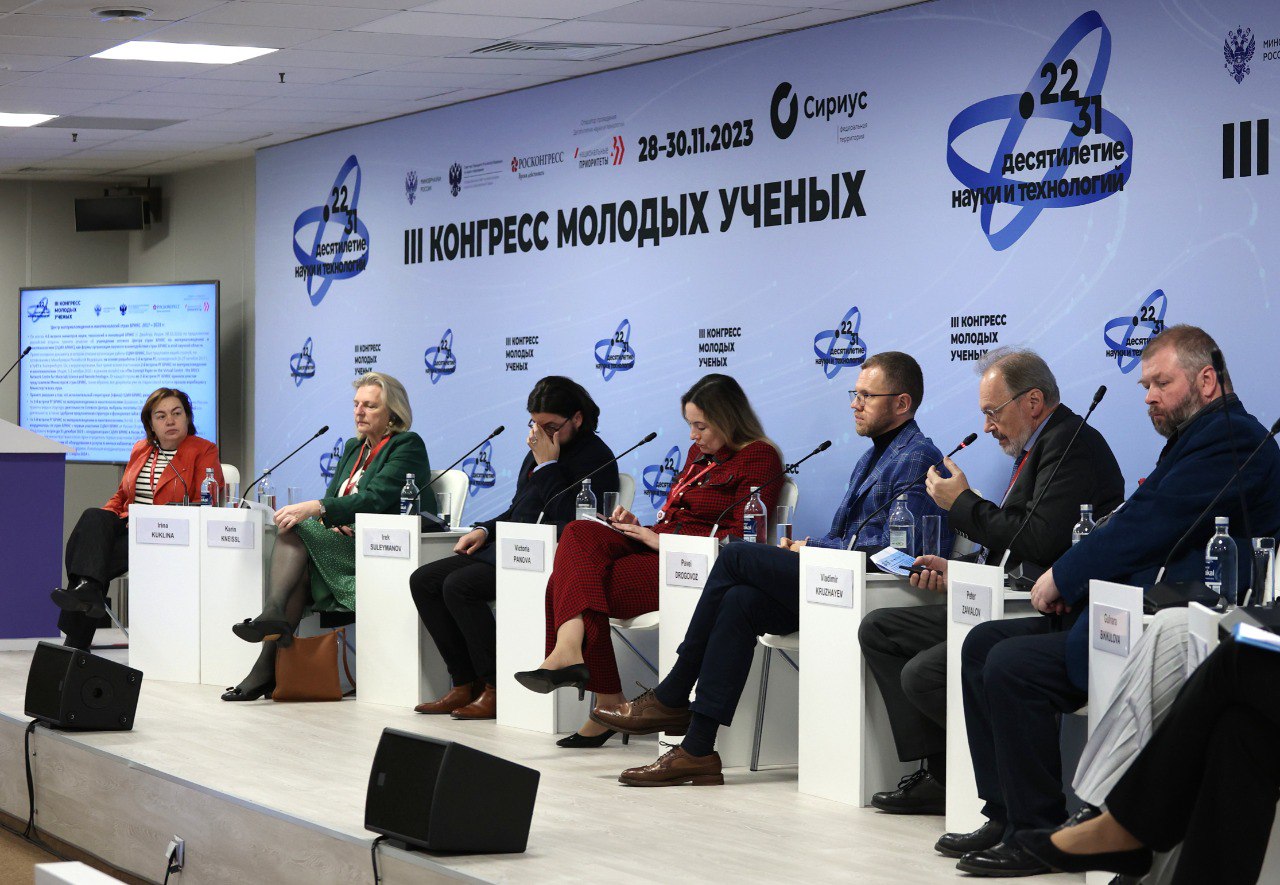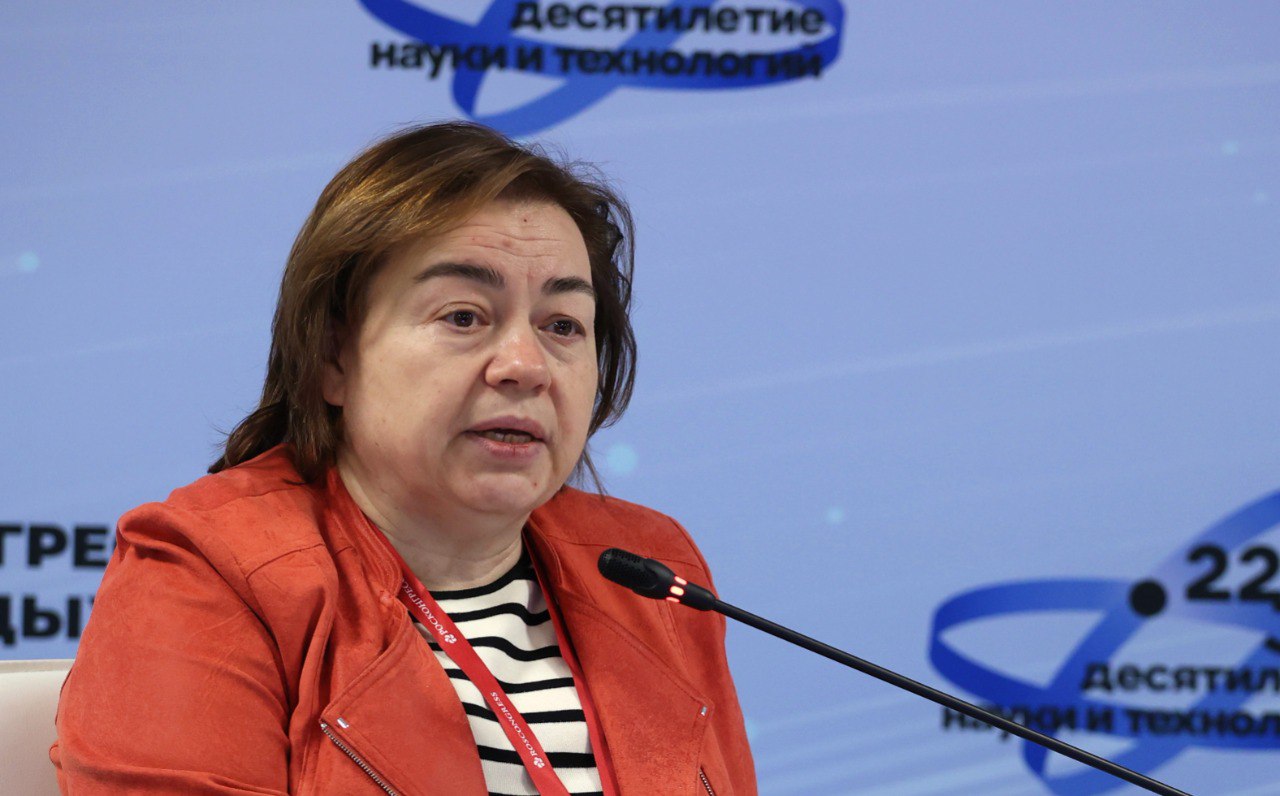The 3rd Congress of Young Scientists, one of the key events of the Decade of Science and Technology, was held on November 28-30, 2023 at the federal territory of Sirius in Sochi. The Congress gathered over 5,000 participants from more than 85 countries, including Belarus, China, Iran, Cuba, South Africa, Kazakhstan and other countries. The participants were young researchers, representatives of business, authorities, scientific and educational organizations, pupils, undergraduate and postgraduate students.
As part of the Congress agenda, the session “BRICS: Russia as the 2024 Chair Country” was held on November 29, 2023. The session was moderated by Irina Kuklina, Executive Director of the International Center for Innovations in Science, Technology and Education (ICISTE).
The session was attended by representatives of the G.O.R.K.I. Center, “Rosatom Corporate Academy”, Skoltech, Bauman Moscow State Technical University, P.P. Shirshov Institute of Oceanology, Ural Federal University, Higher School of Economics, Joint Institute for Nuclear Research, N.D. Zelinsky Institute of Organic Chemistry of the Russian Academy of Sciences.
 |
 |
Irina Kuklina opened the discussion and introduced the participants to the scientific architecture of BRICS. The BRICS group has 13 working groups, 5 forums and a steering committee. The moderator noted that “the BRICS countries’ cooperation in science, technology and innovation is rapidly gaining momentum and is aimed at expanding its activities in the future”.
At the moment, cooperation between the BRICS countries (Brazil, Russia, India, China and South Africa) in the field of science, technology and innovation is one of the most dynamic and rich directions. The organization’s goal is to expand the area of cooperation. Indeed, on January 1, 2024, 6 new countries will join BRICS: Egypt, Iran, UAE, Saudi Arabia, Argentina and Ethiopia.
The session participants discussed the prospects for cooperation, including the BRICS enlargement. This is especially relevant on the eve of Russia’s BRICS Chairmanship in 2024.
The Russian Federation will take over the rotational chairmanship of the BRICS group next year. Special attention will be paid to the science, technology and innovation track: more than 15 events are planned, including those aimed at strengthening cooperation between scientists, scientific teams and innovators of the BRICS countries.
It is worth mentioning the BRICS Young Scientists Forum and the BRICS Innovators’ Call, as well as the results of the 6th BRICS STI Framework Program Competition on the Climate Agenda. During the Russian Chairmanship it is planned to launch flagship research projects that are distinguished by their scale and strategic importance.
The experts discussed the existing mechanisms of interaction within the framework of the BRICS STI and the prospects for cooperation between the BRICS countries under the Russian Chairmanship, taking into account Russia’s initiatives to conduct international land and sea expeditions, as well as to organize internship programs and exchange of scientists.
The session participants stated that over the past 10 years, BRICS has become a rapidly developing technological zone and an actor in the global macroeconomy. To build capacity, BRICS needs transparent boundaries to ensure cooperation between scientific communities and the trust that provides the foundation for their work.
The experts agreed that today, more than ever, partnership work is important in all areas of scientific and technological search, training of young scientific specialists within the framework of joint educational programs, development of common standards, as well as the use of a common technological environment and unity of expert approaches. They noted that especially in 2024, it is necessary to have coordinated priorities and increase the technological sustainability of the economies of the countries through their own scientific and innovative development, import substitution, localization of production and international cooperation in the scientific and technological sphere.
The business agenda of the Congress included other important events aimed at the development of international scientific and technical cooperation. For example, the session “Russia-Africa: Science and Education for Development” was held on the margins of the Congress. The event was focused on youth scientific organizations of Russia and Africa, which create an environment for effective research activities, as well as contribute to the strengthening of professional scientific ties between African scientists.
Experts of the ICISTE conducted tours for representatives of foreign delegations at the Congress. At the “Carbon Supersites” stand, foreign delegates were able to examine new Russian technologies and the principles of their operation within the framework of the implementation of the pilot project.The “Science-ID” stand demonstrated to the representatives of foreign countries the achievements in the production of modern Russian equipment.
